If I could host one guest on The Kill Zone, it’d be Stephen King. That’s not likely to happen, just as it’s not going to happen that I live-host Ian Fleming who created the immensely successful James Bond spy thriller brand. Ian Fleming has been gone from our writing, reading, and viewing world since 1964 — one year after he wrote a masterful essay on his commercial writing approach.
However, I was net-surfing the other night when I stumbled upon this 58-year-old gem titled Ian Fleming Explains How To Write A Thriller, Circa 1963. I read it, reread it, and read it again. “This has to be shared on TKZ,” I said to myself. Then I mumbled about being criticized for plagiarism, so I thought I’d paraphrase it, or edit it, or modify it in some way to maybe shorten it up or put my own twist to it.
“Hang on here!” I said with second thoughts. “Who the hell am I to interfere with thriller writing advice taught by Ian Fleming, told directly in Ian Fleming’s voice, that he intentionally left for the world?” So whack my pee-pee for cut & paste violation, but this piece needs sharing. Here’s the complete and unabridged (shaken, not stirred) 1963 version of How To Write A Thriller by the one and only Ian Fleming:
— — —
“The craft of writing sophisticated thrillers is almost dead. Writers seem to be ashamed of inventing heroes who are white, villains who are black, and heroines who are a delicate shade of pink.
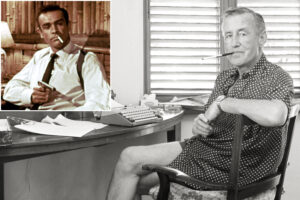 I am not an angry young, or even middle-aged, man. I am not “involved.” My books are not “engaged.” I have no message for suffering humanity and, though I was bullied at school and lost my virginity like so many of us used to do in the old days, I have never been tempted to foist these and other harrowing personal experiences on the public. My opuscula do not aim at changing people or making them go out and do something. They are written for warm-blooded heterosexuals in railway trains, airplanes and beds.
I am not an angry young, or even middle-aged, man. I am not “involved.” My books are not “engaged.” I have no message for suffering humanity and, though I was bullied at school and lost my virginity like so many of us used to do in the old days, I have never been tempted to foist these and other harrowing personal experiences on the public. My opuscula do not aim at changing people or making them go out and do something. They are written for warm-blooded heterosexuals in railway trains, airplanes and beds.
I have a charming relative who is an angry young littérateur of renown. He is maddened by the fact that more people read my books than his. Not long ago we had semi-friendly words on the subject and I tried to cool his boiling ego by saying that his artistic purpose was far, far higher than mine. He was engaged in “The Shakespeare Stakes.” The target of his books was the head and, to some extent at least, the heart. The target of my books, I said, lay somewhere between the solar plexus and, well, the upper thigh.
These self-deprecatory remarks did nothing to mollify him and finally, with some impatience and perhaps with something of an ironical glint in my eye, I asked him how he described himself on his passport. “I bet you call yourself an Author,” I said. He agreed, with a shade of reluctance, perhaps because he scented sarcasm on the way. “Just so,” I said. “Well, I describe myself as a Writer. There are authors and artists, and then again there are writers and painters.”
This rather spiteful jibe, which forced him, most unwillingly, into the ranks of the Establishment, whilst stealing for myself the halo of a simple craftsman of the people, made the angry young man angrier than ever and I don’t now see him as often as I used to. But the point I wish to make is that if you decide to become a professional writer, you must, broadly speaking, decide whether you wish to write for fame, for pleasure or for money. I write, unashamedly, for pleasure and money.
I also feel that, while thrillers may not be Literature with a capital L, it is possible to write what I can best describe as “Thrillers designed to be read as literature,” the practitioners of which have included such as Edgar Allan Poe, Dashiell Hammett, Raymond Chandler, Eric Ambler and Graham Greene. I see nothing shameful in aiming as high as these.
All right then, so we have decided to write for money and to aim at certain standards in our writing. These standards will include an unmannered prose style, unexceptional grammar and a certain integrity in our narrative.
But these qualities will not make a best seller. There is only one recipe for a best seller and it is a very simple one. You have to get the reader to turn over the page.
If you look back on the best sellers you have read, you will find that they all have this quality. You simply have to turn over the page.

Nothing must be allowed to interfere with this essential dynamic of the thriller. This is why I said that your prose must be simple and unmannered. You cannot linger too long over descriptive passages.
There must be no complications in names, relationships, journeys or geographical settings to confuse or irritate the reader. He must never ask himself “Where am I? Who is this person? What the hell are they all doing?” Above all there must never be those maddening recaps where the hero maunders about his unhappy fate, goes over in his mind a list of suspects, or reflects what he might have done or what he proposes to do next. By all means, set the scene or enumerate the heroine’s measurements as lovingly as you wish, but in doing so, each word must tell, and interest or titillate the reader before the action hurries on.
I confess that I often sin grievously in this respect. I am excited by the poetry of things and places, and the pace of my stories sometimes suffers while I take the reader by the throat and stuff him with great gobbets of what I consider should interest him, at the same time shaking him and shouting, “Like this, damn you!” about something that has caught my particular fancy. But this is a sad lapse, and I must confess that in one of my books, Goldfinger, three whole chapters were devoted to a single game of golf.
Well, having achieved a workmanlike style and the all-essential pace of narrative, what are we to put in the book—what are the ingredients of a thriller?
Briefly, the ingredients are anything that will thrill any of the human senses—absolutely anything.
In this department, my contribution to the art of thriller-writing has been to attempt the total stimulation of the reader all the way through, even to his taste buds. For instance, I have never understood why people in books have to eat such sketchy and indifferent meals. English heroes seem to live on cups of tea and glasses of beer, and when they do get a square meal we never hear what it consists of.
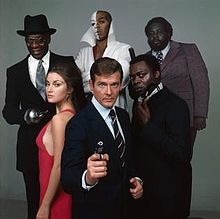 Personally, I am not a gourmet and I abhor food-and-winemanship. My favorite food is scrambled eggs. In the original typescript of Live and Let Die, James Bond consumed scrambled eggs so often that a perceptive proof-reader suggested that this rigid pattern of life must be becoming a security risk for Bond. If he was being followed, his tail would only have to go into restaurants and say “Was there a man here eating scrambled eggs?” to know whether he was on the right track or not. So I had to go through the book changing the menus.
Personally, I am not a gourmet and I abhor food-and-winemanship. My favorite food is scrambled eggs. In the original typescript of Live and Let Die, James Bond consumed scrambled eggs so often that a perceptive proof-reader suggested that this rigid pattern of life must be becoming a security risk for Bond. If he was being followed, his tail would only have to go into restaurants and say “Was there a man here eating scrambled eggs?” to know whether he was on the right track or not. So I had to go through the book changing the menus.
It must surely be more stimulating to the reader’s senses if, instead of writing “He made a hurried meal off the Plat du Jour—excellent cottage pie and vegetables, followed by home-made trifle” (I think this is a fair English menu without burlesque) you write “Being instinctively mistrustful of all Plats du Jour, he ordered four fried eggs cooked on both sides, hot buttered toast and a large cup of black coffee.” No difference in price here, but the following points should be noted: firstly, we all prefer breakfast foods to the sort of food one usually gets at luncheon and dinner; secondly, this is an independent character who knows what he wants and gets it; thirdly, four fried eggs has the sound of a real man’s meal and, in our imagination, a large cup of black coffee sits well on our taste buds after the rich, buttery sound of the fried eggs and the hot buttered toast.
What I aim at is a certain disciplined exoticism. I have not re-read any of my books to see if this stands up to close examination, but I think you will find that the sun is always shining in my books—a state of affairs which minutely lifts the spirit of the English reader—that most of the settings of my books are in themselves interesting and pleasurable, taking the reader to exciting places around the world, and that, in general, a strong hedonistic streak is always there to offset the grimmer side of Bond’s adventures. This, so to speak, “pleasures” the reader . . .
At this stage let me pause for a moment and assure you that, while all this sounds devilish crafty, it has only been by endeavoring to analyze the success of my books for the purpose of this essay that I have come to these conclusions. In fact, I write about what pleases and stimulates me.
My plots are fantastic, while being often based upon truth. They go wildly beyond the probable but not, I think, beyond the possible. . . . Even so, they would stick in the gullet of the reader and make him throw the book angrily aside—for a reader particularly hates feeling he is being hoaxed—but for two further technical devices, if you like to call them that.
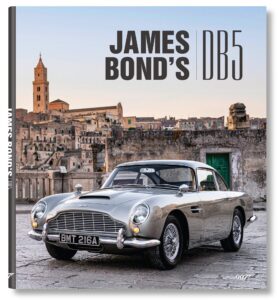 First of all, the aforesaid speed of the narrative, which hustles the reader quickly beyond each danger point of mockery and, secondly, the constant use of familiar household names and objects which reassure him that he and the writer have still got their feet on the ground. This is where the real names of things come in useful. A Ronson lighter, a 4.5 litre Bentley with an Amherst-Villiers supercharger (please note the solid exactitude), the Ritz Hotel in London, the 21 Club in New York, the exact names of flora and fauna, even James Bond’s Sea Island cotton shirts with short sleeves. All these details are points de repère to comfort and reassure the reader on his journey into fantastic adventure.
First of all, the aforesaid speed of the narrative, which hustles the reader quickly beyond each danger point of mockery and, secondly, the constant use of familiar household names and objects which reassure him that he and the writer have still got their feet on the ground. This is where the real names of things come in useful. A Ronson lighter, a 4.5 litre Bentley with an Amherst-Villiers supercharger (please note the solid exactitude), the Ritz Hotel in London, the 21 Club in New York, the exact names of flora and fauna, even James Bond’s Sea Island cotton shirts with short sleeves. All these details are points de repère to comfort and reassure the reader on his journey into fantastic adventure.
Well, I seem to be getting on very well with picking my books to pieces, so we might as well pick still deeper. People often ask me, “How do you manage to think of that? What an extraordinary (or sometimes extraordinarily dirty) mind you must have.”
I certainly have got vivid powers of imagination, but I don’t think there is anything very odd about that. We are all fed fairy stories and adventure stories and ghost stories for the first 20 years of our lives, and the only difference between me and perhaps you is that my imagination earns me money. But, to revert to my first book, Casino Royale, there are strong incidents in the book which are all based on fact. I extracted them from my wartime memories of the Naval Intelligence Division of the Admiralty, dolled them up, attached a hero, a villain and a heroine, and there was the book.
The first was the attempt on Bond’s life outside the Hotel Splendide. SMERSH had given two Bulgarian assassins box camera cases to hang over their shoulders. One was of red leather and the other one blue. SMERSH told the Bulgarians that the red one contained a bomb and the blue one a powerful smoke screen, under cover of which they could escape.
One was to throw the red bomb and the other was then to press the button on the blue case. But the Bulgars mistrusted the plan and decided to press the button on the blue case and envelop themselves in the smoke screen before throwing the bomb. In fact, the blue case also contained a bomb powerful enough to blow both the Bulgars to fragments and remove all evidence which might point to SMERSH.
Farfetched, you might say. In fact, this was the method used in the Russian attempt on Von Papen’s life in Ankara in the middle of the war. On that occasion the assassins were also Bulgarians and they were blown to nothing while Von Papen and his wife, walking from their house to the embassy; were only bruised by the blast.
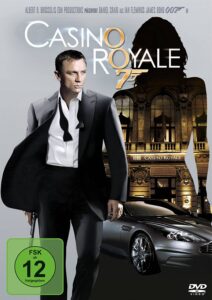 As to the gambling scene, this grew in my mind from the following incident. I and my chief, the Director of Naval Intelligence—Admiral Godfrey—in plain clothes, were flying to Washington in 1941 for secret talks with the American Office of Naval Intelligence, before America came into the war. Our seaplane touched down at Lisbon for an overnight stop, and our Intelligence people told us how Lisbon was crawling with German secret agents. The chief of these and his two assistants gambled every night in the casino at the neighboring Estoril. I suggested to the DNI that he and I should have a look at these people. We went, and there were the three men, playing at the high chemin de fer table. Then the feverish idea came to me that I would sit down and gamble against these men and defeat them, thereby reducing the funds of the German Secret Service.
As to the gambling scene, this grew in my mind from the following incident. I and my chief, the Director of Naval Intelligence—Admiral Godfrey—in plain clothes, were flying to Washington in 1941 for secret talks with the American Office of Naval Intelligence, before America came into the war. Our seaplane touched down at Lisbon for an overnight stop, and our Intelligence people told us how Lisbon was crawling with German secret agents. The chief of these and his two assistants gambled every night in the casino at the neighboring Estoril. I suggested to the DNI that he and I should have a look at these people. We went, and there were the three men, playing at the high chemin de fer table. Then the feverish idea came to me that I would sit down and gamble against these men and defeat them, thereby reducing the funds of the German Secret Service.
It was a foolhardy plan which would have needed a golden streak of luck. I had £50 in travel money. The chief German agent had run a bank three times. I bancoed it and lost. I suivied and lost again, and suivied a third time and was cleaned out, a humiliating experience which added to the sinews of war of the German Secret Service and reduced me sharply in my chief’s estimation.
It was this true incident which is the kernel of Bond’s great gamble against Le Chiffre.
Finally, the torture scene. What I described in Casino Royale was a greatly watered-down version of a French-Moroccan torture known as passer á la mandoline, which was practiced on several of our agents during the war.
So you see the line between fact and fantasy is a very narrow one. I think I could trace most of the central incidents in my books to some real happenings.
We thus come to the final and supreme hurdle in the writing of a thriller. You must know thrilling things before you can write about them. Imagination alone isn’t enough, but stories you hear from friends or read in the papers can be built up by a fertile imagination and a certain amount of research and documentation into incidents that will also ring true in fiction.
Having assimilated all this encouraging advice, your heart will nevertheless quail at the physical effort involved in writing even a thriller. I warmly sympathize with you. I too, am lazy. My heart sinks when I contemplate the two or three hundred virgin sheets of foolscap I have to besmirch with more or less well-chosen words in order to produce a 60,000 word book.

Ian Fleming’s Goldeneye House, Jamaica
In my case, one of the first essentials is to create a vacuum in my life which can only be satisfactorily filled by some form of creative work, whether it be writing, painting, sculpting, composing or just building a boat. I am fortunate in this respect. I built a small house on the north shore of Jamaica in 1946 and arranged my life so I could spend at least two months of the winter there. For the first six years I had plenty to do during these months exploring Jamaica, coping with staff and getting to know the locals, and minutely examining the underwater terrain within my reef.
But by the sixth year I had exhausted all these possibilities, and I was about to get married – a prospect which filled me with terror and mental fidget. To give my idle hands something to do, and as an antibody to my qualms about the marriage state after 43 years as a bachelor, I decided one day to damned well sit down and write a book. The therapy was successful. And while I still do a certain amount of writing in the midst of my London Life, it is on my annual visits to Jamaica that all my books have been written.
But, failing a hideaway such as I possess, I can recommend hotel bedrooms as far removed from your usual “life” as possible. Your anonymity in these drab surroundings and your lack of friends and distractions in the strange locale will create a vacuum which should force you into a writing mood and, if your pocket is shallow, into a mood which will also make you write fast and with application.
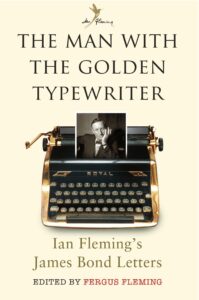 So far as the physical act of writing is concerned, the method I have devised is this. I do it all on the typewriter, using six fingers. The act of typing is far less exhausting than the act of writing, and you end up with a more or less clean manuscript. The next essential is to keep strictly to a routine—and I mean strictly. I write for about three hours in the morning—from about 9:30 till 12:30—and I do another hour’s work between 6 and 7 in the evening. At the end of this I reward myself by numbering the pages and putting them away in a spring-back folder. The whole of this four hours of daily work is devoted to writing narrative.
So far as the physical act of writing is concerned, the method I have devised is this. I do it all on the typewriter, using six fingers. The act of typing is far less exhausting than the act of writing, and you end up with a more or less clean manuscript. The next essential is to keep strictly to a routine—and I mean strictly. I write for about three hours in the morning—from about 9:30 till 12:30—and I do another hour’s work between 6 and 7 in the evening. At the end of this I reward myself by numbering the pages and putting them away in a spring-back folder. The whole of this four hours of daily work is devoted to writing narrative.
I never correct anything and I never go back to what I have written, except to the foot of the last page to see where I have got to. If you once look back, you are lost. How could you have written this drivel? How could you have used “terrible” six times on one page? And so forth. If you interrupt the writing of fast narrative with too much introspection and self-criticism, you will be lucky if you write 500 words a day and you will be disgusted with them into the bargain.
By following my formula, you write 2,000 words a day and you aren’t disgusted with them until the book is finished, which will be, and is, in my case, in about six weeks.
I don’t even pause from writing to choose the right word or to verify spelling or a fact. All this can be done when your book is finished.
When my book is finished I spend about a week going through it and correcting the most glaring errors and rewriting passages. I then have it properly typed with chapter headings and all the rest of the trimmings. I then go through it again, have the worst pages retyped and send it off to my publisher.
They are a sharp-eyed bunch at Jonathan Cape and, apart from commenting on the book as a whole, they make detailed suggestions which I either embody or discard. Then the final typescript goes to the printer and in due course the galley or page proofs are there and you can go over them with a fresh eye. Then the book is published and you start getting letters from people saying that Vent Vert is made by Balmain and not by Dior, that the Orient Express has vacuum and not hydraulic brakes, and that you have mousseline sauce and not Béarnaise with asparagus.
 Such mistakes are really nobody’s fault except the author’s, and they make him blush furiously when he sees them in print. But the majority of the public does not mind them or, worse, does not even notice them, and it is a salutary dig at the author’s vanity to realize how quickly the reader’s eye skips across the words which it has taken him so many months to try to arrange in the right sequence.
Such mistakes are really nobody’s fault except the author’s, and they make him blush furiously when he sees them in print. But the majority of the public does not mind them or, worse, does not even notice them, and it is a salutary dig at the author’s vanity to realize how quickly the reader’s eye skips across the words which it has taken him so many months to try to arrange in the right sequence.
But what, after all these labors, are the rewards of writing and, in my case, of writing thrillers?
First of all, they are financial. You don’t make a great deal of money from royalties and translation rights and so forth and, unless you are very industrious and successful, you could only just about live on these profits, but if you sell the serial rights and the film rights, you do very well.
Above all, being a comparatively successful writer is a good life. You don’t have to work at it all the time and you carry your office around in your head. And you are far more aware of the world around you.
Writing makes you more alive to your surroundings and, since the main ingredient of living, though you might not think so to look at most human beings, is to be alive, this is quite a worthwhile by-product of writing, even if you only write thrillers, whose heroes are white, the villains black, and the heroines a delicate shade of pink.”
— — —
My takeaways? Too many to mention. Over to you Kill Zoners. What’d you get from this essay? And what’s the best thriller writing advice you’ve ever received (or could give, for that matter)?
— — —
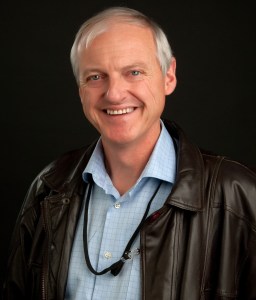 Garry Rodgers has never met a spy. (Not that he knows of.) In fact, he’s never met anyone all that thrilling except, of course, his wife Rita. But Garry has had a few thrilling adventures during his three decades as a homicide detective and coroner. He’s no stranger to baggin’ the bodies.
Garry Rodgers has never met a spy. (Not that he knows of.) In fact, he’s never met anyone all that thrilling except, of course, his wife Rita. But Garry has had a few thrilling adventures during his three decades as a homicide detective and coroner. He’s no stranger to baggin’ the bodies.
Now in mid-stride, Garry Rodgers reinvented himself as a crime writer who’s creating an upcoming series titled City Of Danger. It’s a different (but not too different) new take on old hardboiled detective fiction he’s writing in net-streaming style. Garry also hosts a popular blog at DyingWords.net and psychopathically tweets on Twitter. Check him out.

Thank you for hosting Ian Fleming this morning, Garry. The essay you featured originally appeared in Books and Bookmen, a wonderful publication which alas is no longer with us. It featured articles from across every conceivable spectrum by authors who were happy to give full vent to their positions. I believe that many if not all of the issues are available through public library services. I am too busy trying to find one with all of the back issues of Police Gazette to check right now but it will be next on my list.
My favorite takeaway from Fleming’s article is “I don’t even pause from writing to choose the right word or to verify spelling or a fact. All this can be done when your book is finished.” I’ve heard that before and need to remember it. I picked up the habit as a young child of picking scabs and never broke the habit. It’s never too late to stop.
Thanks for a terrific offering this morning, Garry. Have a great weekend.
Joe, I love that piece of advice from Fleming as well. Whenever I find myself writing slowly, that’s often the reason.
Sorry for the delay in responding, Joe. There was some glitch in my system that wouldn’t allow me to open this. I just put a general comment out there about this problem and – Boom – it opened up. Go figger technology…
Yes, this write fast and don’t look back till your done works for me. Most of the time…
Great post, Garry. Thanks for finding and sharing this article. The advice reminds me of all the wonderful instruction on writing that I’ve found here at TKZ, for that is where I’ve received the majority of my education on writing thrillers (plus the many craft books described and recommended here.)
What caught my eye about the advice in Fleming article, were the points that I haven’t seen elsewhere (or missed, if they were there). I particularly liked his advice about the speed of the narrative. “First of all, the aforesaid speed of the narrative, which hustles the reader quickly beyond each danger point of mockery.” I’m trying to learn to write with more “depth” and reflection. I guess there are places in the plot where we should hustle the reader along before they start picking apart the details.
Thanks for sharing this article, Garry. And have a great weekend!
Hi Steve! Nice to hear you and others found this interesting. I was truly impressed when I found it, quite by accident. It’s like having Ian Fleming sitting right beside you and having a nice chat.
This is what I love – practical “here’s how I do it” by someone who successfully did what I would like to do.
6 weeks.
I am taking waaaaay too long.
Cynthia, I feel exactly the same way. It’s inspiring and energizing to read Fleming talk about drafting a book in six weeks–I managed it with the first two novels in my Empowered series, but then slowed down, because I started doing the things Fleming himself avoided while writing.
We need a beach house. We can each book two months and rotate among the group.
Truly practical and totally realistic tutorial, Cynthia. I picked up that he shot for a 60K word product. A very interesting commercial target.
I’ve seen all the early James Bond movies(Sean Connery) but have never read any of Fleming’s Bond books. After reading this charmingly-worded essay, I want to read them.
I have read them all and enjoy them. Start with the full novels and then if you are so inclined, the short stories.
Garry, thanks so much for posting/hosting Ian Fleming this morning. Truly timeless advice. Like you, there are so many takeaways here. One that I think is especially crucial is one that Stephen King also emphasized–getting the reader to turn the page. Creating dramatic tension on every page, especially in a thriller, is the key to having a book that is highly readable and “unputdownable,” my ultimate goal in any fiction I write, be it fantasy, mystery or thriller.
Hi Dale. Sorry, I missed your comment – must have scrolled by it and the WordPress site has been fussy today. I think we mutually agree On Writing is probably the best resource ever published.
Wow. There’s so much great advice here, Garry. My favorite is to have a schedule and stick with it (paraphrasing). To me, that’s the most important trait of a professional writer.
Thought you’d like it, Sue. When I found it – completely by accident – I knew this had to go up on the KZ. I did struggle with the perception of plagiarism – but is there really any difference between copying and pasting the entire text or just making a hyperlink to the existing webpiece that’s sitting in the public domain? At least I didn’t claim this to be my own writing because that would be complete and utter fraud. There’s no way I could write something this elegant!
Garry, thanks for bringing Ian Fleming’s “How to Write a Thriller” to us. In addition to learning a few new words (I have to use “opuscula” in a book at some point), I loved his advocating “thrillers designed to be read as literature.” I especially liked his method of writing on a schedule and never looking back until the first draft is finished.
But more than his practical advice, I found myself completely charmed by the article, and I was turning the virtual pages as fast as I could. I think he could have written an essay on “How to Paint a House” and I would have been enchanted. Maybe we can learn as much from his style as from his instruction.
This really is elegant writing, Kay. It’s mesmerizing – like having the man right in your room. Talk about voice!
“The target of my books, I said, lay somewhere between the solar plexus and, well, the upper thigh.”
Yep.
Yep, right in the pee-pee arena. Thanks for commenting, Terry, and enjoy your day!
I will note that is also the general area of a gentleman’s wallet.
Good one, Alan!
Good morning, Kill Zone folks. Sorry for not replying to comments yet. I can read them in my email browser but can’t get them open on the WordPress site. I can’t even open the piece through Google on the KZ website. It’s been doing this to me quite a bit lately – seems to take like half a day before I can open the current post. Anyone else experiencing this?
I’ve been having this problem with the site for several weeks, and lately, the email I’m set to receive is arriving later and later.
Me three…
Same here. I’m almost a day behind being able to open TKZ posts.
Another great article that appears to have vanished forever was by one of the founding Grande Dames of romantic suspense, Phyllis Whitney. The piece of advice I remember as the most useful is to never have a character just folding laundry and thinking unless the ax murderer is behind her. The reader knows it through various clues, but the main character hasn’t been paying as much attention so high suspense.
I had to Google Phyllis Whitney, Marilynn. Wow! She penned over 70 novels. Not only that, she lived to the ripe old age of 104!
I loved Phyllis Whitney!
I love Whitney too! Along with many of her novels I have her “Guide to Fiction Writing” on my shelf to this day, purchased back when being published was only a dream for me. Her differentiation between people who wanted to be a writer and people who wanted to write clarified so much for me.
Phyllis Whitney’s Guide to Fiction Writing is one of my all-time favorite craft books.
I loved it! I have read and enjoyed all of Fleming’s Bond books. I read somewhere that Fleming introduced name brand products to his stories. The original product placement if you will.
After reading all of the stories it is interesting that he did not always follow his own advice. “Quantum of Solace” is a very boring story and all of the “thrill” takes place of one man telling another a story in an English club room. The story might have been shocking in 1960 it is not today.
Thank you for finding and sharing this.
Nice to hear you appreciated this piece, Alan. I picked up that Mr. Fleming wrote three chapters dedicated to one game of golf. I wish I could get golfing lessons that were as helpful as his tips on thriller writing. Fore!!!
I know a guy 🙂
Interesting comment. Fleming did not write Quantum of Solace, well he did, but it was a short story, not a Bond novel. The film makers took the title but the screenwriters produced something completely unrelated to the short story. The short story, which is essentially about a failed marriage, is more like the sort of story Somerset Maugham would heve written.
Great reminder from a pro. Thanks, Garry.
BTW, Not only was Ian Fleming a terrific writer who took good advice from other writers, he was an ace marketer and knowledgable about the inner workings of publishing. He kept a steely eye on the finances and worked hard on marketing his books. I go into the details here in my 2018 post over at my blog with Anne R. Allen titled: What Ian Fleming Did to Make James Bond a Success (Besides Write Terrific Books)
https://annerallen.com/2018/08/ian-fleming-james-bond-success/
Fleming’s letters are charming and wonderfully witty, well worth a read. They were collected by his nephew in “The Man With The Golden Typewriter.” Here’s the link:
https://www.amazon.com/Man-Golden-Typewriter-Flemings-Letters-ebook/dp/B0164G8FUU/ref=sr_1_1?ie=UTF8&qid=1534624884&sr=8-1&keywords=The+Man+With+The+Golden+Typewriter
Good morning, Ruth! Thanks for the link to your post – really informative. I didn’t know much about Ian Fleming, himself, until I stumbled on this essay. It’s, like… invaluable. Truly a top performer.
Not like Canada Post. Imagine the Brits getting same-day mail service. It takes three to four days here to get a letter from Vancouver to Vancouver Island – 24 miles across the Strait and there is hourly ferry service and half-hour plane hops. Yep, some things really were better back in the good ole days. And enjoy your day!
“Writers seem to be ashamed of inventing heroes who are white, villains who are black, and heroines who are a delicate shade of pink.”
He wrote this in 1963!? Imagine what he’d say about our current times.
One of the many reasons I prefer self-publishing is that my stories are primarily what used to be called the “men’s adventure genre.” Hard-boiled mystery, noir crime, westerns, spy stories, military. If you try to sell a book nowadays, it better be about a woman inside a Venn diagram of at least 17 victim groups.
That also struck me as pushing the 2021 limits 🙂
Awesome post, Garry! Fleming in the flesh is just as entertaining as on the page or the big screen. You sent me flying to the search bar for a description of that torture he talked about. Sorry I did. It’ll become a permanent part of my synaptic relays, I’m sure. Of all the species on earth, humans can be the absolute best to each other, or the absolute worst to each other.
You have to get the reader to turn the page.
I swear, there’s an echo in the TKZ halls. I’ve heard that from every last one of you here…there must be something in it.
And, for my favorite Fleming quote from this post: You don’t have to work at it all the time and you carry your office around in your head.
Best life ever! 🙂
Is there a page turning app available, Deb? If so, I’d like to install it in my ebooks. This manual method of having to come up with creative content doesn’t work for me all the time.
???
Priceless. Simply priceless.
This essay truly is a masterpiece. Thanks for dropping by, Suzanne!
Thank you. This was brilliant on so many levels. The part I most need to hear is not to go back and re-read the work from the day before. I also love that he spoke about his use of everyday objects and their specific names in order to ground the reader. Something my all-time idol, Mary Higgins Clark, did in all her books. There was something soothing in reading about a heroine having a BLT with a cup of coffee for lunch, even if she was in the midst of a battle of wits with a cunning and cruel murderer. This was an inspirational post for me.
I’m really pleased with your feedback, Margaret. Looks like others found this as fascinating as I did 🙂
Fascinating post, Garry!
And I can’t stop thinking about this: ” I do it all on the typewriter, using six fingers.”
Huh? Which six fingers???
Good morning, Harald. Yeah, this essay really sticks to me. I also wondered about this six finger typing business. I use three and get around 1,000 words per hour. If I trained myself to use another three, would my rate double to 2K?